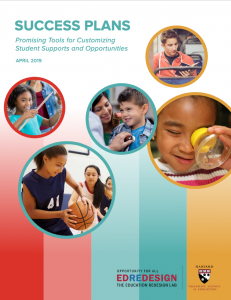 The Education Redesign Lab released a new report identifying personalized Success Plans as a promising strategy to support children both in and outside of school, along with a toolkit to guide communities to develop and implement what it refers to as Success Plans.
The Education Redesign Lab released a new report identifying personalized Success Plans as a promising strategy to support children both in and outside of school, along with a toolkit to guide communities to develop and implement what it refers to as Success Plans.
The one-size-fits-all approach, which has guided our current school system since its early 20th century origins, simply does not address the complex and varied needs of today’s children, particularly those living in poverty,” said Paul Reville, founding director of the Education Redesign Lab.
The report, Success Plans: Promising Tools for Customizing Student Supports and Opportunities explores the potential of personalized, “success planning” systems through an analysis of 13 organizations and agencies implementing different types of plans.
The report and toolkit offer recommendations and a roadmap to communities interested in developing Success Plans, which bring together schools, government agencies and community-based providers to identify students’ strengths, interests and needs, and then matches children and youth with customized and comprehensive supports and opportunities. There is growing evidence of the positive impact of customizing student supports.
The Executive Summary identifies ten guiding principles that define the concept of Success Plans:
Personalized: Celebrate each child’s assets and use a customized approach to identify individual strengths, interests, and needs.
Comprehensive: Offer a wide array of academic, health, and other support services to meet the needs of children and youth from cradle to career.
Student-centered: Empower children and youth to discover and pursue their academic and non-academic strengths and interests, set short- and long-term goals, and identify needs.
Equitable: Target systemic gaps that disproportionately affect marginalized students and ensure that the development and implementation of the plans will increase access to essential supports and opportunities.
Actionable: Establish clear strategies and processes for identifying and delivering supports and services to each child and youth both in and out of school.
Relationship-driven: Allocate appropriate staffing to jointly develop and implement the plans with students by fostering mutually respectful relationships and also involve parents, families, and other adults in the process.
Cross-sector: Provide coordinated, comprehensive services by establishing collaborative relationships with partner organizations across multiple sectors.
Information-driven: Utilize feedback and data from multiple sources, including students, families, and a diverse set of agencies, to regularly assess impact on multiple outcomes and enhance the quality of services provided.
Secure: Use digital platforms that meet high standards of data security and protect student and family privacy.
Sustainable: Identify long-term funding sources and create organizational structures to ensure consistent implementation over time.
Get the Executive Summary. Download the full report and toolkit.
Excerpted from the press release, “Education Redesign Lab at Harvard Graduate School of Education Calls for Personalized Success Plans for Students” and the report summary.